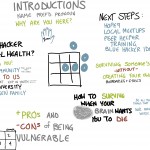Hi there.
My name is Robin.
I hang out at a Seattle, WA, US maker space called Jigsaw Renaissance. I’m a geek-girl, hobby scientist who likes to put pointless LEDs in clothes, make stars in the microwave, and grow bioluminescent algae in her free time. I’m a social worker by training.
But I’m writing here at Blue Hacker because I don’t want anyone to die.
Yep. That’s it.
That’s the sum total of my investment in Blue Hackers.
When any of us decides to end our lives, we do so because we believe it is the most effective means to end pain and suffering. I don’t fault anyone for that. And I also know that its incredibly difficult to openly discuss depression, suicide, self harm, addiction, and other things that make us feel crappy in the context of hacker and maker culture.
Hackers see things differently than many people. This is a dark gift. On one hand, we have the opportunity, sometimes with blinding brilliance, to make great leaps in our chosen areas. Yet on the other hand, its challenging to find others who share our interests and abilities and connect with those others in meaningful ways.
The world needs all the creativity, skill, and perspective hackers can bring to bear on the problems and challenges we currently face.
I want to be part of the solution. Part of what works. Part of people feeling accepted, seen, acknowledged, validated, cared about in my community.
Once or twice a month I’ll be posting some things here. If you have ideas or questions about mental health, please leave a reply to this post or shoot me an email. I’ll do my best to give you a response that reflects the current best knowledge and practices from a professional mental health perspective as it applies to hackers.
I hope you are kicking ass, and not getting your ass kicked.
Robin
